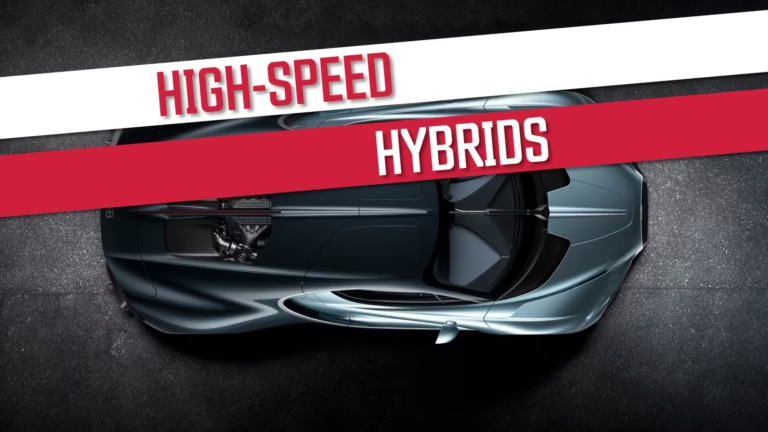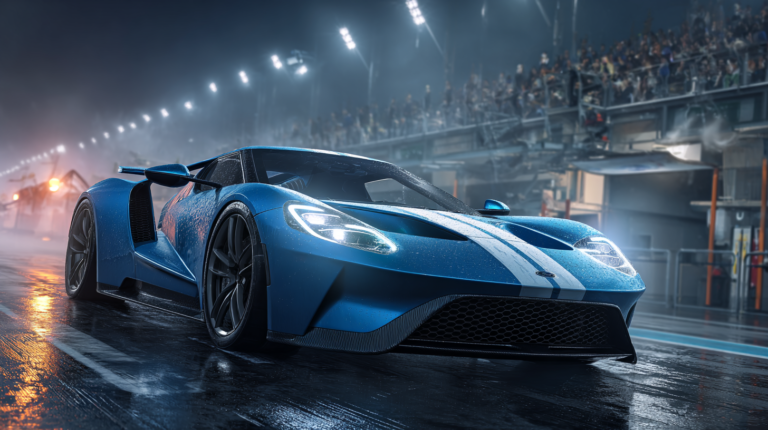TL;DR:
- Discover the Fastest Hybrid Cars of 2025, highlighting advanced performance metrics and top manufacturers setting the speed standard.
- Explore engine specifications, comparing electric and gasoline powertrains that deliver maximum power for an exhilarating driving experience.
- Understand what makes a hybrid car fast, including the crucial roles of aerodynamics, weight, and regenerative braking technologies.
- Examine how fast hybrid cars stack up against traditional sports cars in terms of acceleration, fuel efficiency, and market price accessibility.
- Get insights into future technologies like solid-state batteries and innovative hybrid drive systems poised to revolutionize performance in the automotive industry.
Dive into the full article for a comprehensive look at the rapid evolution of hybrid technology and what it means for speed enthusiasts in 2025!
Introduction
Fastest Hybrid Cars of 2025 are set to redefine the way we think about performance and efficiency. As we dive into the future, it’s clear that hybrid technology is not just about fuel savings anymore. These vehicles are engineering marvels, combining electric power with heart-pounding speed. Imagine a car that can soar from zero to sixty in mere seconds while also caring for the planet. In 2025, we will witness an exciting array of hybrids that leave traditional sports cars in the dust. Buckle up as we explore the fastest hybrid cars to watch this year. You won’t want to miss this thrilling ride!
What are the Fastest Hybrid Cars of 2025?
Have you ever wondered how far hybrid technology has come in the quest for speed and performance? As we gear up for 2025, hybrid cars are not just about fuel efficiency—they are also pushing the limits of speed. The fastest hybrid cars of 2025 showcase incredible engineering, merging performance with environmental consciousness. This article dives into their performance metrics, key manufacturers, and the innovative technologies driving them forward.
Overview of Performance Metrics
- Horsepower exceeding 600
- Torque levels that propel cars from 0 to 60 mph in under 3 seconds
- Top speeds surpassing 200 mph
These numbers illustrate not just the raw power, but the blend of electric and gasoline capabilities that make these hybrids unique.
Key Manufacturers Leading the Charge
Several manufacturers are at the forefront of hybrid performance. Brands like Ferrari, Porsche, and Toyota are pioneering models that redefine what it means to be a hybrid. Each company brings its own innovations and race heritage, creating cars that not only compete with traditional supercars but often surpass them in speed and efficiency.
Innovations in Hybrid Technology
At the heart of the fastest hybrid cars of 2025 are groundbreaking technologies. From enhanced electric drive systems to advanced battery management techniques, these innovations contribute to improved acceleration and efficiency. The integration of artificial intelligence for vehicle performance optimization is also expected to be a game changer, allowing cars to adapt to driving conditions in real time.
In summary, the fastest hybrid cars of 2025 are a remarkable melding of speed, efficiency, and technology, appealing not only to performance enthusiasts but also to environmentally conscious drivers. With evolving innovations and leading manufacturers, the future looks bright for hybrid performance cars. For more insights on automotive advancements, check out resources from “Autoblog“.
Which Hybrid Cars Offer the Most Power?
As the automotive industry shifts towards more sustainable driving options, the quest for performance in hybrid cars intensifies. A key question arises: which hybrids pack the most power? The fastest hybrid cars of 2025 not only strive for efficiency but also deliver impressive engine specifications that challenge traditional gasoline models.
Analyzing Engine Specifications
- Horsepower ratings ranging from 150 to 300 HP.
- Torque figures that enhance acceleration.
These numbers directly impact a vehicle’s performance on the road, making them competitive with many gasoline sports cars.
Electric Versus Gasoline Powertrains
When comparing electric and gasoline powertrains in hybrid vehicles, each has its advantages. Electric powertrains deliver instant torque, providing quick acceleration and responsive handling. In contrast, gasoline engines can sustain higher speeds over long distances. The best hybrids leverage both technologies, such as the Ford Escape Hybrid, which utilizes its electric motor for efficient city driving and its gasoline engine for highway performance.
How Torque and Horsepower Impact Speed
An understanding of torque and horsepower is crucial for appreciating hybrid car performance. Torque, the rotational force produced by an engine, contributes to acceleration. Conversely, horsepower measures the engine’s ability to maintain a speed over time. For instance, hybrids that balance both—like the Porsche Panamera 4 E-Hybrid—achieve remarkable speeds by optimizing their electric motors alongside traditional engines.
In summary, the fastest hybrid cars of 2025 are not just about eco-friendliness but also deliver substantial power, demonstrating the advances in hybrid technology. For those who seek thrilling performance alongside sustainability, these hybrids are pioneering the future of automotive excellence.
For further insights, consider checking out resources from “Car and Driver”, “MotorTrend”, “Edmunds”, “Autotrader”, “Roadshow” or “Consumer Reports”.
What Makes a Hybrid Car Fast?
What constitutes the speed of a hybrid car? As the market trends toward eco-friendly solutions, the quest for the fastest hybrid cars of 2025 raises compelling questions about performance, engineering, and technology.
Hybrid cars blend gasoline engines with electric motors, presenting unique challenges and opportunities when it comes to speed. The synergy between these two power sources can deliver thrilling acceleration and high top speeds while maintaining fuel efficiency.
The Role of Aerodynamics in Speed
Aerodynamics plays a crucial role in a hybrid car’s speed. With sleek designs and optimized body shapes, manufacturers aim to reduce drag, allowing hybrids to slice through the air more efficiently. Improved airflow leads to greater stability at high speeds, enhancing performance.
Impact of Weight and Materials on Performance
Weight significantly influences a hybrid car’s speed. Lightweight materials, such as carbon fiber and advanced aluminum alloys, help manufacturers reduce overall vehicle mass. This reduction not only facilitates faster acceleration but also improves handling, making them more agile on the road.
Enhancements from Regenerative Braking
Regenerative braking systems offer notable advantages for hybrid cars. By capturing kinetic energy typically lost during braking, these systems recharge the electric battery, improving efficiency. This added power can be redirected to boost acceleration, contributing to overall speed performance.
For more in-depth information on hybrid technology advancements, consider visiting sources like “U.S. Department of Energy,” “Car and Driver,” and “MotorTrend”.
How Do Fast Hybrid Cars Compare to Traditional Sports Cars?
Speed Tests and Acceleration Comparisons
What defines performance in the world of cars? Speed and acceleration are often the most scrutinized metrics. Fast hybrid cars, like the fastest hybrid cars of 2025, have made impressive strides in this realm. Manufacturers leverage innovative technologies to enhance their performance. For instance, models like the Toyota Prius Prime can accelerate from 0-60 mph in just 6.6 seconds, showcasing a surprising agility compared to traditional sports cars which often boast similar or slightly faster times. The shift to hybrid powertrains lends itself to rapid burst acceleration, making these vehicles exciting competitors in drag races and real-world scenarios alike.
Fuel Efficiency and Environmental Benefits
While speed is critical, fuel efficiency and environmental impact are important factors in today’s automotive landscape. Fast hybrid cars outperform traditional sports models significantly in fuel economy—often achieving over 40 miles per gallon. This efficiency not only reduces fuel costs but also lowers carbon emissions, making these hybrids much friendlier to the environment. For example, the Honda Accord Hybrid combines impressive speed with an eco-conscious mindset. As climate concerns grow, hybrid vehicles are increasingly considered the future of performance driving.
Price Points and Market Accessibility
When comparing fast hybrid cars to traditional sports cars, price is a crucial factor. Many hybrids, including the fastest hybrid cars of 2025, are accessible at lower starting points. While top-end sports cars can reach exorbitant prices, performance hybrids like the Ford Escape Hybrid tend to offer competitive features without breaking the bank, appealing to a wider audience. The accessibility of these vehicles allows more consumers to experience hybrid performance, making them a compelling choice for both speed enthusiasts and environmentally conscious buyers alike.
What Future Technologies Can Enhance Hybrid Performance?
As the automotive industry rapidly evolves, enthusiasts are keenly interested in identifying the fastest hybrid cars of 2025. Emerging technologies play a crucial role in enhancing hybrid performance, addressing the demands for speed, efficiency, and eco-friendliness. What innovative solutions could reshape the driving experience?
The Potential of Solid-State Batteries
Solid-state batteries are poised to revolutionize hybrid vehicles by offering several advantages over traditional lithium-ion batteries. These batteries promise higher energy density, quicker charging times, and enhanced safety due to their reduced risk of overheating. Automotive manufacturers like Toyota and Volkswagen are investing heavily in this technology, which could lead to hybrids that deliver faster acceleration and longer ranges.
Advancements in Hybrid Drive Systems
Hybrid drive systems are continuously being refined to improve performance. Innovations such as dual-motor setups and intelligent power distribution systems enable faster and more responsive acceleration. Companies like Honda and Porsche are at the forefront, developing hybrid systems that seamlessly blend electric and gasoline power, maximizing efficiency while enhancing speed.
Emerging Tech Trends to Watch in the Auto Industry
Several emerging tech trends are set to influence hybrid performance. For instance, advancements in lightweight materials, such as carbon fiber composites, can significantly reduce vehicle weight, thereby boosting speed. Additionally, the integration of artificial intelligence (AI) in vehicle dynamics control can enhance handling and performance. Keeping an eye on these trends ensures that performance car enthusiasts stay informed about the fastest hybrid cars of 2025.
You can explore more about advancements in electric vehicles at “Green Tech Media”, hybrid innovations on “Automotive News”, solid-state battery developments from “MIT Technology Review”, and cutting-edge automotive technology insights at “Car and Driver”. For a deeper dive into performance metrics, refer to “MotorTrend” and “Edmunds”.
Conclusione:
In summary, the landscape of the fastest hybrid cars of 2025 is set to transform the automotive industry, blending sustainability with exhilarating performance. Our exploration of various models highlights their impressive acceleration, innovative technologies, and enhanced efficiency. As manufacturers push the envelope of hybrid engineering, these vehicles are poised to redefine speed and eco-friendliness. To stay updated on the advancements in this thrilling niche, we invite you to dive deeper into our articles on hybrid innovations and electric vehicles. Discover how the fusion of speed and sustainability can shape the future of driving!



